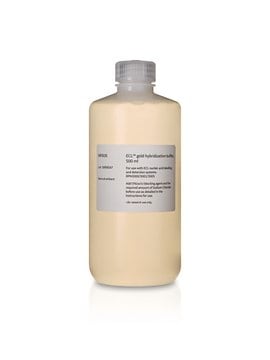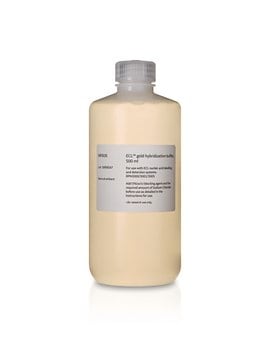GERPN3005
ECL™ Direct Nucleic Acid
Cytiva RPN3005, pack of 1 ea
About This Item
Empfohlene Produkte
Verpackung
pack of 1 ea
Hersteller/Markenname
Cytiva RPN3005
Lagertemp.
2-8°C
Verwandte Kategorien
Allgemeine Beschreibung
Anwendung
Each system includes the following reagents, sufficient for labeling 5 to 10 μg nucleic acid and detecting 2000 to 4000 cm2 of membrane (depending on product ordered): labeling reagent, crosslinker, control DNA, blocking agent, ECL™ Detection Reagents, and ECL™ Gold Hybridization Buffer.
Lagerung und Haltbarkeit
Hinweis zur Analyse
Rechtliche Hinweise
Ähnliches Produkt
Signalwort
Danger
Lagerklassenschlüssel
12 - Non Combustible Liquids
Analysenzertifikate (COA)
Suchen Sie nach Analysenzertifikate (COA), indem Sie die Lot-/Chargennummer des Produkts eingeben. Lot- und Chargennummern sind auf dem Produktetikett hinter den Wörtern ‘Lot’ oder ‘Batch’ (Lot oder Charge) zu finden.
Besitzen Sie dieses Produkt bereits?
In der Dokumentenbibliothek finden Sie die Dokumentation zu den Produkten, die Sie kürzlich erworben haben.
Artikel
Hintergrund und Protokolle, die verschiedene in der Molekularbiologie eingesetzte Verfahren zum Nachweis von Proben von an Membranen gebundene Proteine oder Nukleinsäuren beschreiben.
Background and protocols describing the various methods used by molecular biologists to detect samples of protein or nucleic acids bound to membranes.
Unser Team von Wissenschaftlern verfügt über Erfahrung in allen Forschungsbereichen einschließlich Life Science, Materialwissenschaften, chemischer Synthese, Chromatographie, Analytik und vielen mehr..
Setzen Sie sich mit dem technischen Dienst in Verbindung.








